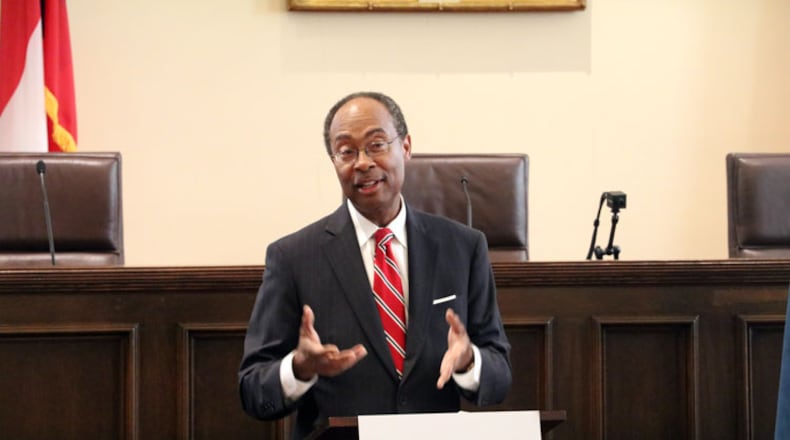A federal judge on Wednesday will hear arguments on whether the state complied with his order to draw new political districts after he ruled the previous maps illegally diluted Black voting power under the Voting Rights Act of 1965.
U.S. District Judge Steve Jones in October tossed Georgia’s current congressional and legislative district maps, ruling that the ones created by the Republican-led General Assembly in 2021 failed to provide adequate opportunities for Black voters. The population of Georgia’s Black voters has surged since 2010 while the number of white voters declined.
Attorneys for the state say the General Assembly followed Jones’ order, which required lawmakers to create one new majority-Black congressional district, two new majority-Black state Senate districts and five new majority-Black state House Districts. But groups that sued the state over the 2021 districts say the GOP’s maps fall short of the judge’s order because they move around voters in a way that still denies Black voters representation.
Jones will now have to decide whether the newly drawn district lines illegally discriminate based on race, or sort voters by their political preferences, which is allowed.
Alpha Phi Alpha Fraternity, a historically Black fraternity that’s been active in civil rights causes, and other plaintiffs successfully sued the state over the 2021 maps.
In court filings, attorneys for Alpha Phi Alpha said the new maps ignore the detailed instructions Jones provided about where to create additional majority-Black districts.
“The General Assembly’s purported remedy makes a mockery of that process, the court’s ruling, and the Voting Rights Act, and reflects the state’s continued refusal to afford minority voters equal opportunity to participate in the electoral process,” attorneys wrote in their objections to the new maps.
Attorneys for the state said lawmakers followed the judge’s guidelines to create the additional majority-Black districts. They said the plaintiffs are challenging the new maps because those changes don’t lead to additional Democratic districts.
“Plaintiffs advance the theory that Georgia is required to protect even majority-white districts due solely to the fact that they currently elect Democratic officials, even though this is not what the Voting Rights Act or this court required,” attorneys wrote.
The state and the plaintiffs also disagree on the definition of minority “opportunity” or “coalition” districts, generally defined as areas where racial minority groups are able to elect their preferred candidates by attracting some support from white voters. Jones didn’t specify the meaning of those terms in his order.
The question of whether multiracial coalition districts are covered by the Voting Rights Act is unsettled among appellate courts and the U.S. Supreme Court.
Attorneys for the plaintiffs argue that the state unnecessarily “dismantled” Congressional District 7, where nonwhite voters make up a majority of the population but no one race makes a majority. The state’s attorneys argue that the Voting Rights Act does not require multiracial coalition districts, which they refer to as “crossover districts,” to be protected.
“If this court finds that crossover districts are ‘minority opportunity districts,’ then it is requiring the Legislature to protect political coalitions rather than ensuring the equality of Black electoral opportunities,” attorneys for the state wrote.
If the state is successful in its challenge of “opportunity districts,” it could weaken protections nationwide of districts where Black voters and other racial groups together make up a majority.
If the maps meet Jones’ approval, they will be used in the 2024 elections. If not, he will likely appoint a mapmaking expert to draw districts that meet his requirements.
The 11th U.S. Circuit Court of Appeals and the U.S. Supreme Court could ultimately decide the case.
Jones will likely rule on the maps quickly, as state election officials have said districts must be finalized by late January in time to prepare for next year’s elections.
About the Author






